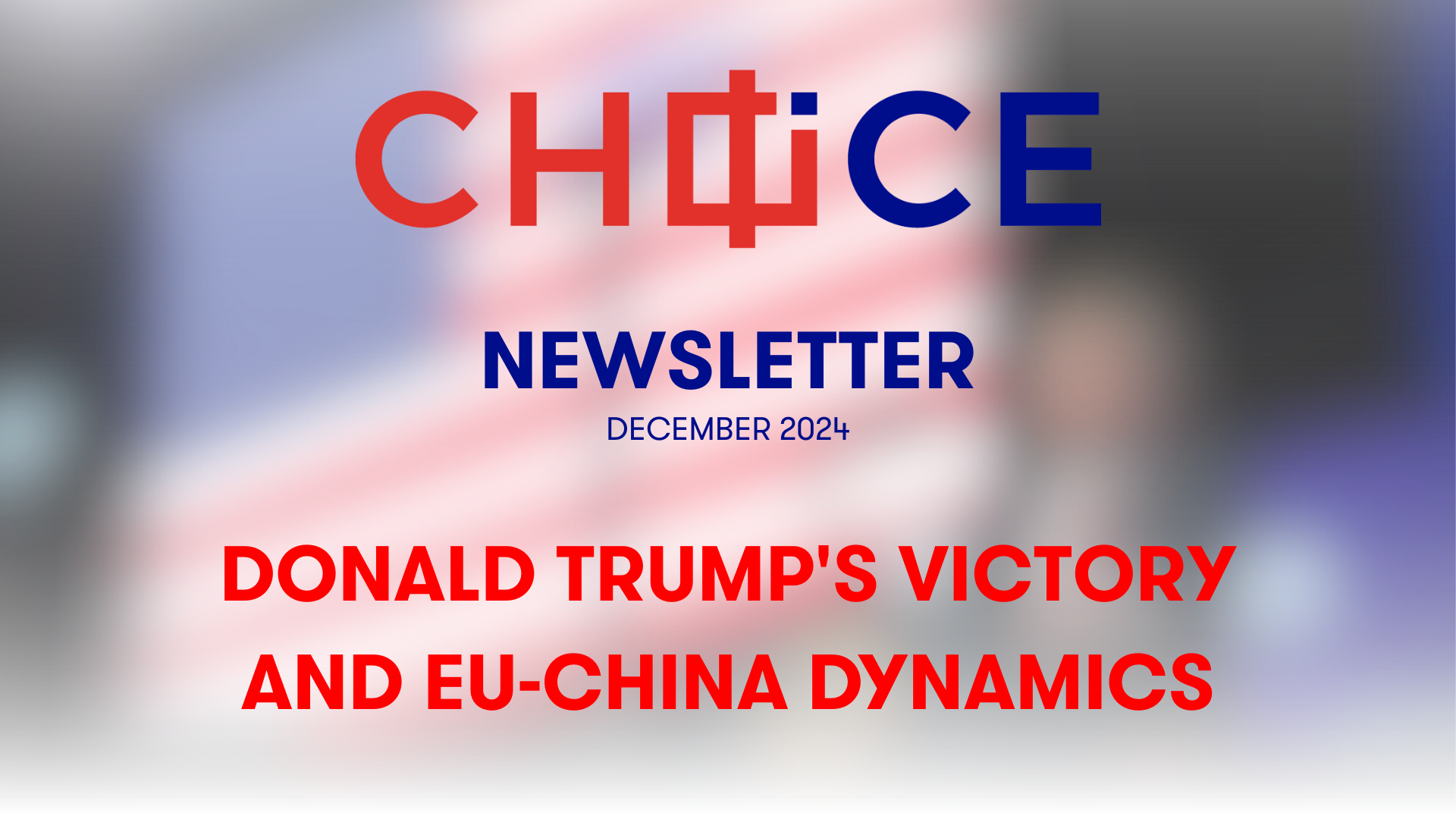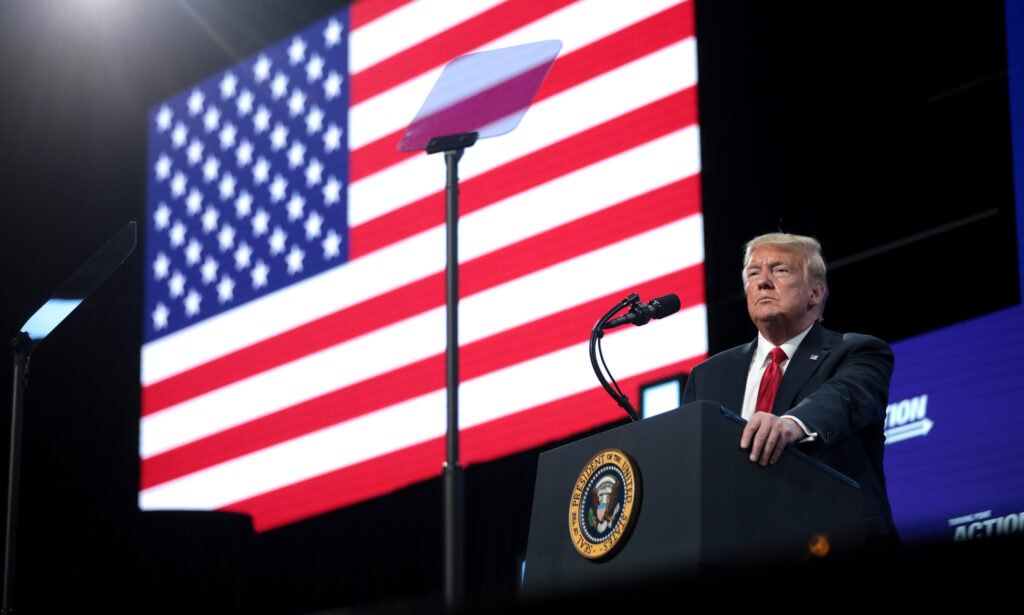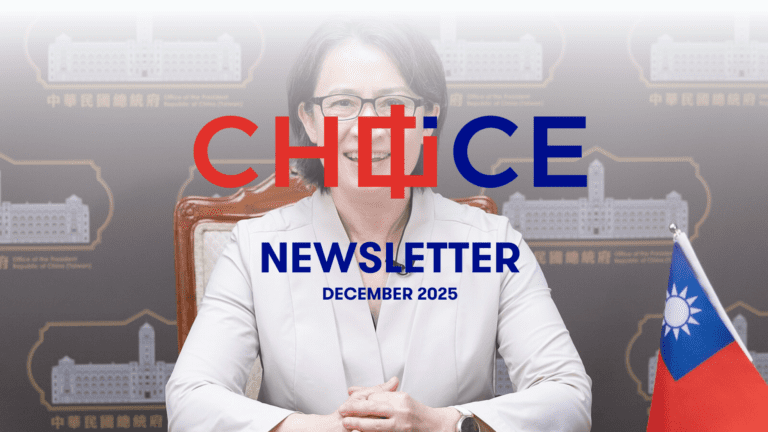CHOICE Newsletter: Insights on Donald Trump’s Victory, EU-China Dynamics, and Taiwan’s Digital Battles

Dear Reader,
November has been nothing short of a whirlwind of activity for our China team. From global developments to local buzz, we have been right at the heart of the discussions. Trump’s victory in the US presidential election ignited fresh debates about the future of US foreign policy vis-à-vis China and the trajectory of transatlantic relations. At CHOICE, we gathered our experts to tackle these tough questions, and we are excited to share their insights with you.
Meanwhile, we also turned our lens eastward in the latest episode of our podcast, featuring the brilliant Puma Shen. We took a deep dive into Taiwan’s cyberspace, exploring how influence operations are shaping its digital landscape and presenting unique challenges for the region. Closer to home, a story of a Czech influencer visiting China went viral and set the Czech online community ablaze. Was it a simple travelogue, or did it play into the hands of Chinese propaganda? We’ve unpacked the controversy to help you separate fact from fiction.
To cap off a busy month, our team took steps to sharpen our skills and stay ahead of the curve. Through intensive training sessions, we explored the boundless possibilities of open source intelligence and advanced analytical tools, equipping ourselves to tackle even the most complex challenges with confidence. From global headlines to local controversies, this edition connects the dots and brings you timely insights – Let’s dive in!
CHOICE Take

As the world adjusts to the reality of Donald Trump’s return to the White House, the international community is preparing for the potential effects of his re-election. European leaders now face the challenge of recalibrating their strategies to engage with a reinvigorated Trump administration, while key questions loom about the potential shifts in global politics: Will Trump revive his tariff-driven economic policies? How will his presidency redefine US-China relations? And could his approach deepen internal divisions over the EU’s China strategy?
Prior to his election victory, Trump has emphasized strong focus on addressing trade imbalances and protecting the US economy. He has also issued warnings to both the EU and China, entertaining the idea of imposing tarrifs of more than 60% on all Chinese products and 10 to 20% tariffs on imported goods from other countries, including EU member states. These measures, if implemented, could disrupt global supply chains and increase material costs. Take Germany, for example – with its collapsed government, increased competition with China, and its deep ties to both the US and Chinese markets, it finds itself in a particularly vulnerable spot. If tensions escalate, Germany could be hit from both sides: facing tariffs on its exports to the US, while dealing with rising costs for critical components imported from China.
The 2024 US presidential election has also unveiled the intricate geopolitical calculations of Central and Eastern European (CEE) countries, each wrestling with the potential implications. From the Czech Republic’s economic apprehensions to Slovakia’s polarized political landscape, and Hungary’s opportunistic maneuvering, the region is recalibrating its strategic positioning. Poland’s pragmatic diplomacy, the Baltic states’ underlying security concerns, and Serbia’s delicate balancing act between US and China collectively illuminate the complex challenge of maintaining autonomy amid the intensifying US-China rivalry. As these nations navigate the shifting geopolitical terrain, their responses reflect a nuanced understanding of the delicate interdependencies that shape their future.
Amid Trump’s assertive trade stance, EU capitals are navigating how best to manage the pressure – compromising on their China policies may prove to be a bargaining tool. However, the EU’s lack of consensus on China policy adds complexity. Although the EU recently agreed to impose tariffs on imports of Chinese-made electric vehicles, the decision was far from unanimous. Trump’s potential push for a tougher EU stance on China could amplify these tensions. Economic considerations, such as Germany’s reliance on trade with China, make some countries wary of alienating Beijing. Meanwhile, political dynamics further complicate the picture, with leaders like Viktor Orbán maintaining close ties with China.
For Xi Jinping and Chinese Communist Party, the uncertainty and erratic behaviour emblematic of Donald Trump present a significant challenge to China’s diplomatic playbook. Moreover, the pressing question remains: how much strain can the Chinese economy withstand? Intensifying trade tensions with the US, coupled with China’s high youth unemployment, mounting local government debt, property market slump, and sluggish domestic consumption, poses a significant challenge for Beijing.
Yet, amidst these challenges, a silver lining may emerge for China: the potential erosion of US-EU relations and deepening fragmentation within the EU. As the bloc continues to grapple with internal divisions over its China policy, further discord could play to Beijing’s advantage, enabling it to exploit opportunities in a less united Europe.
Additionally, if Trump’s “America First” policy results in diminished US engagement in international organizations and forums, Beijing could seize the opportunity to fill the void. By leveraging its global initiatives, China stands to expand its influence not only economically across the Global South but also diplomatically, positioning itself as a global mediator in conflicts such as Russia’s invasion of Ukraine or the ongoing conflict in the Middle East.
Trump’s transactional approach to foreign policy could also provide Beijing an opportunity to negotiate with the US administration over Taiwan’s status. Trump’s recent comments about Taiwan’s semiconductor industry and its financial responsibilities for US defense support will likely be closely monitored in Beijing.
All in all, the next four years under the Trump administration promise to bring significant changes on the global stage. His cabinet nominations, which include figures known for their hawkish approach towards China such as Marco Rubio and Mike Waltz, signal a potentially firmer stance. However, the inclusion of figures like Elon Musk could introduce a more tempered approach. Ultimately, what lies ahead remains uncertain – as the world watches, only time will tell how Trump’s presidency will shape the future of international relations.
By Dominika Urhová, CHOICE Analyst
Taiwan in Focus
Taiwan’s Angst Over Trump’s Presidency
While expected the news that Donald Trump is set to return to the White House on January 20, 2025, is a wake-up call for Taiwan, raising two major uncertainties. The first revolves around US-China relations. Trump stated his intention to raise tariffs on Chinese imports by further 10%. China could respond by offering to build new factories in the US, potentially creating jobs in Trump-supporting states. This could then be used as a leverage to pressure Washington to scale back its support for Taipei, a scenario that could have significant implications for Taiwan’s security – though this remains unlikely given the current geological climate, with an intensified trade war being a more likely scenario.
The second uncertainly pertains to Taiwan’s military spending. Taiwan’s defense budget is expected to reach 2.6% of its GDP in 2025, which is a record high by local standards. However, during his campaign, Trump suggested that Taiwan should boost its military spending to at least 10%, noting that the US would no longer subsidize its allies at the same rate as before and might even disengage from previous security agreements.
Domestically, the Legislative Yuan is dominated by the Beijing-friendly Kuomintang and its allies, who oppose any significant increases in military spending. This leaves Taiwan with limited options. One potential course of action is to increase its arms purchases from the US, which totaled over $2 billion in 2024. Another option could be to expand its semiconductor manufacturing capacity in the US, creating a more direct economic stake at the relationship.
At the same time, given Trump’s unpredictable foreign policy stance, Taiwan cannot afford to rely solely on the US. To bolster its deterrence capabilities, it must also look to its own resources and cultivate stronger ties with other international allies. As Beijing continues to ramp up military activities around Taiwan, the need for a robust and more independent defense strategy has never been more urgent.
By Filip Noubel, CHOICE Analyst (based in Taipei)
CHOICE News
 We are thrilled to announce three new partnerships with leading European institutions in Chinese and Taiwan Studies: Taiwan Research Hub, SOAS China Institute, and LSE IDEAS (see our post on X).
We are thrilled to announce three new partnerships with leading European institutions in Chinese and Taiwan Studies: Taiwan Research Hub, SOAS China Institute, and LSE IDEAS (see our post on X).
 Our Founder and Lead, Ivana Karásková provided her commentary on the topic of Chinese propaganda in Czech social media and the recent visit of Czech influencer Michálek to China (YouTube video with Lukefry, article for CzechCrunch).
Our Founder and Lead, Ivana Karásková provided her commentary on the topic of Chinese propaganda in Czech social media and the recent visit of Czech influencer Michálek to China (YouTube video with Lukefry, article for CzechCrunch). Ivana also accepted an invitation to a podcast by Czech Radio, further discussing the story of Jan Michálek and Chinese propaganda (podcast Vinohradská 12).
Ivana also accepted an invitation to a podcast by Czech Radio, further discussing the story of Jan Michálek and Chinese propaganda (podcast Vinohradská 12). Dominika Urhová co-wrote an article for the Cairo Review, discussing Beijing’s role in the Gaza conflict (read here).
Dominika Urhová co-wrote an article for the Cairo Review, discussing Beijing’s role in the Gaza conflict (read here).
 In November, our team participated in a number of trainings that opened new horizons for our analytical work – we deepened our knowledge in working with open sources, explored tools that make tackling everyday analytical challenges more efficient, and learned about podcast production (see our post on LinkedIn).
In November, our team participated in a number of trainings that opened new horizons for our analytical work – we deepened our knowledge in working with open sources, explored tools that make tackling everyday analytical challenges more efficient, and learned about podcast production (see our post on LinkedIn).
 We’re on Bluesky! Stay updated with our latest articles, insights, and news by following our account – don’t miss out on valuable content and updates. (follow us here)
We’re on Bluesky! Stay updated with our latest articles, insights, and news by following our account – don’t miss out on valuable content and updates. (follow us here)
This is the web version of our newsletter. If you’d like to receive the CHOICE newsletter in advance, straight to your inbox, sign up here:
Written by
CHOICE
CHOICE is a multinational consortium of experts providing informed analysis on the rising influence of the People’s Republic of China within the countries of Central and Eastern Europe (CEE).


